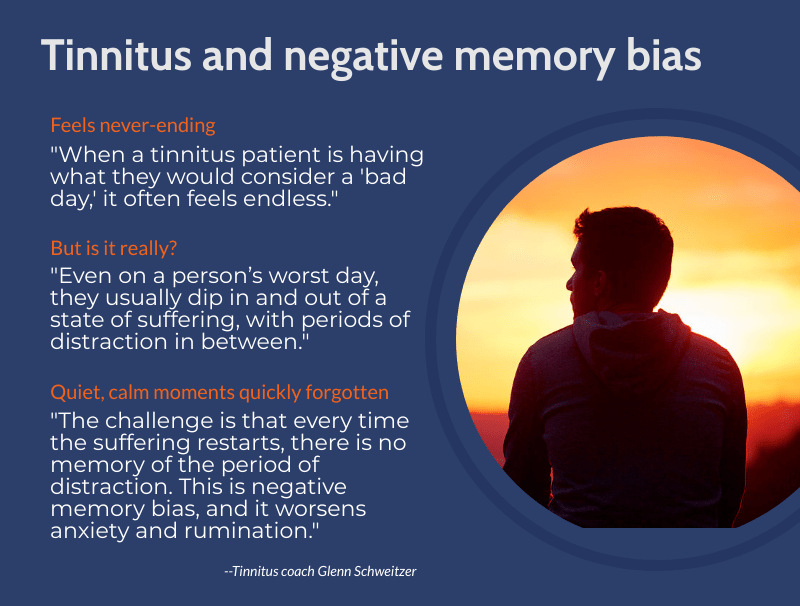[ad_1]
Negative thoughts are one of the most difficult and pervasive challenges that tinnitus sufferers face on a daily basis.
This shouldn’t come as a surprise. When you live with ringing in the ears, stress levels can rise quickly and it’s common to experience anxiety, panic, anger and frustration. Catastrophic thoughts are often the result.

In the moment, these negative thoughts can almost feel like your mind is committing an act of sabotage by creating an additional layer of suffering on top of whatever actual emotional, psychological or physiological pain you are experiencing at the time.
But even when you are not actively experiencing anxiety (or any other type of discomfort), negative thoughts may still arise and manifest suffering that would not have existed otherwise.
The good news is there’s a reason that tinnitus patients struggle with these kinds of negative thoughts, and once you understand why it is happening, you can start to fight back.
Fight or flight and anxiety thoughts
The first thing you need to understand is why anxiety and tinnitus are so deeply intertwined.
It all starts with the fact that we evolved to use our sense of hearing to detect and respond to danger and threats in our immediate environment.
Imagine you’re a prehistoric human eating dinner in a cave during a noisy thunderstorm, while a dangerous and hungry animal quietly approaches. If that animal steps on a small twig at the opening of the cave, you would want that small sound to instantly cut through the sound of the storm and pump you full of adrenaline, so you can get away safely or confront the danger head on.
This is an example of the fight-or-flight stress response in action. It can feel like anxiety in the moment, but it serves an important purpose in our survival.
The problem is that the brain and nervous system are not very good at telling the difference between real and imagined danger (whether the source is a sound or otherwise), and so fight or flight is initiated all the same, even if the danger is only imagined.
This is how the vicious cycle of tinnitus suffering begins–the sound activates the brain’s threat detection systems, triggering fight or flight in the sympathetic nervous system, which then forces your attention to what your brain perceives is the source of the danger: the sound itself.
But because the tinnitus doesn’t just magically disappear, you often end up stuck in an anxiety state, with an endless supply of anxiety thoughts.

Frame of mind can change everything
The next thing you need to understand is that in almost every situation, good or bad, our thoughts and frame of mind can completely change how we feel. This is especially true when we are experiencing hardship, because the story we tell ourselves about what it all means can heavily influence the intensity and quality of our suffering.
This concept applies directly to tinnitus-related negative thoughts, but it’s a little bit easier to understand if you think about it from the viewpoint of something more concrete: exercise.
Think back to the last time you had a really intense workout. The physical sensations of intense exercise are not exactly pleasant: Muscles burn with effort, your heart’s pounding faster and faster as you become more breathless, while sweating like crazy as your body tries to cool itself.
On their face, these sensations are not at all pleasant, but if they occur during exercise, you aren’t suffering either. You’re working hard for a purpose.
You do not regret having felt these sensations as you worked out.
Just the opposite, you are telling yourself a very specific story about what these sensations mean, and the result is a positive experience rather than a negative one.
But now imagine waking up in the middle of the night feeling these exact same sensations–muscles burning, breathless, drenched in sweat, heart racing. It’s an unimaginable experience of suffering. You would probably think you’re having a heart attack and would call for an ambulance.
A key difference between these two experiences is your frame of mind–the thoughts you are having about what it all means. In one situation you’re happy and not suffering at all, in the other, you’re terrified and miserable.
This applies directly to tinnitus as well. Your thoughts have the power to amplify your suffering exponentially or reduce it dramatically.
Fortunately, you can change these negative thoughts in a variety of ways to reduce your suffering, or even avoid it altogether.
Negative memory bias: Why negative tinnitus thoughts are so pervasive
The final piece of the puzzle is to understand that we are predisposed to have only negative thoughts about tinnitus for the simple reason that the only times we’re actually thinking about it is when it’s bothering us.
When you’re coping well or distracted from the sound, you aren’t thinking about your tinnitus at all.
So of course all of your thoughts about your tinnitus are negative–the negative thoughts are the only conscious thoughts you had in the first place, and all you will remember in hindsight.
This psychological phenomenon is known as negative memory bias, and it explains why sufferers have such intense and pervasive negative thoughts about their tinnitus.
When a tinnitus patient is having what they would consider a “bad day,” it often feels like an endless, oppressive, horrible experience. But even on a person’s worst days, what almost always actually happens is that they dip in and out of a state of suffering, with periods of distraction in between.
The challenge is that every time the suffering starts again, there is no memory of the period of distraction. They will only remember the other times it was negatively affecting them throughout the day because there are no counterbalancing memories of the tinnitus not bothering them when they were distracted.
Once you’re aware of the effect of negative memory bias, you can start to change not only the nature of your thoughts, but the effect they have on your suffering.
But if you were somehow able to secretly record the emotional state of a tinnitus sufferer once per minute for 24 hours, and then ask them to guess the ratio of minutes suffering to minutes distracted, they would likely not only guess wrong, but wrong by an order of magnitude.
Luckily, once aware of the effect of negative memory bias, you can start to change not only the nature of your thoughts, but the effect they have on your suffering.
Strategy 1: Reframe negative thoughts to force a new perspective
When your tinnitus grabs your attention (for any reason), the resulting suffering can ramp up quickly. This is true of most intensely negative emotional reactions. For example, think of how quickly anger and anxiety can escalate when triggered.
But you don’t reach 100% intensity instantly–there’s always a period of rapid escalation–and if you can catch yourself quickly enough in those first moments, you can use a simple reframing technique to change the nature of your thoughts. By doing so, you can force a radical change in perspective that instantly reduces suffering by changing the story you are telling yourself about what it all means. It can make it a lot easier to cope.
The next time you are having negative thoughts and feeling bothered by your tinnitus in some way, all you have to do is ask yourself a simple question: When was the last time my suffering was this intense?
Even if it feels like the answer is, “I’ve been suffering this badly all day,” chances are that it’s not true – it just feels that way because of negative memory bias. So really think about it. Maybe it’s been an hour since it was last this bad, or maybe it has been a few hours or a few days. Maybe it’s only been 10 minutes.
No matter how long it’s been, if it just started bothering you more intensely, that means a change occurred. Some (potentially long) period of time passed where you were distracted from the sound. And it’s only now, in this new moment of suffering, that you can notice it in hindsight.
The challenge is that you have to force yourself to notice it. But when you do, it forces you to have different thoughts and a new mental frame. It’s no longer “I’ve suffered all day” it’s “I was feeling OK just before this started.”
It might seem like a small thing, but it’s not, because it allows you to actually notice the times where you were distracted and not bothered by the tinnitus, and it breaks the illusion that you’ve been suffering all day long without any kind of respite. Both of which have the power to end negative thinking in the moment.
Strategy 2: Avoid negative thought triggers
One of the other big sources of negative tinnitus-related thoughts comes from a place you might not expect: other people.
Tinnitus is a difficult health problem that affects hundreds of millions of people around the world, and in the process of researching tinnitus, you will encounter the suffering of others.
Unfortunately, Googling tinnitus or browsing tinnitus support groups on Facebook or other message boards can be a double-edged sword. On one hand, it’s a chance to connect with other people who actually understand what you’re going through, and there is the potential to find valuable and helpful information. But it can also become an echo chamber of suffering, and more often than not, reading about the intense suffering of others can make your suffering worse by amplifying your fear.
My best advice for this is that once you commit to a habituation strategy or treatment plan, stop all tinnitus-related googling and avoid the message boards and groups.
As a general rule of thumb, if you read or watch tinnitus-related content that makes you feel worse in some way, or more afraid than you did before, you’ve done yourself a disservice.
Strategy 3: Improve your morning routine
Waking up to the sound of your tinnitus blaring is a difficult way to start the day, and it usually doesn’t take long for negative thoughts to bubble up to the surface.

This is compounded by the fact that it’s hard to sleep with tinnitus in the first place. You may be waking up sleep deprived, earlier than you wanted to be awake. When this happens, many sufferers stay in bed tossing and turning, failing to fall back to sleep as frustration builds. It’s a recipe for rumination and negative thinking.
Fortunately, you can reduce these negative thoughts by making a few changes to your morning routine.
The first step is to sleep with sound masking so you don’t wake up in silence. This alone doesn’t solve the problem but it’s a much better way to start your day than waking up in a silent bedroom to your tinnitus at full volume.
The next change is to force yourself to get out of bed right away, even if you woke up earlier than you intended. The longer you stay in bed, the greater the likelihood of having negative thoughts.
The last change is to have the first 20 minutes of your morning routine planned out entirely, so you don’t have to make decisions. You can just get up and go. I recommend turning on different sound masking (music, podcasts, radio shows, and audiobooks work well for this), and then just go through the motions of your morning routine.
For bonus points, you can finish it off with a breathing technique or other coping tool.
This strategy isn’t meant to prevent negative thoughts all day long, but it can help you start the day off on the right foot and set a better tone for the rest of the day.
More: Apps for tinnitus
Tinnitus strategies take practice
It’s important to understand that these strategies are not meant to be a complete solution.
There are still many more things you can be doing to address the problem of negative thoughts. Counseling, for example, is a good option and something I recommend to everyone struggling with tinnitus. (Cognitive behavioral therapy works especially well in this regard).
If you suffer from tinnitus, I hope you will try to put some of these strategies into practice. With time and repetition, they can make a profoundly positive impact on your day-to-day quality of life.
[ad_2]
Source link


